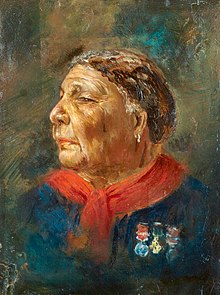Mary Seacole
Mary Jane Seacole (* 1805 in Kingston as Mary Jane Grant, † May 14, 1881 in London , England ) was a Jamaican nurse , hotelier and author .
Life
Her father, a Scot , was a British officer, her mother a Jamaican healer who ran one of the best hotels in Kingston. In her homeland, Mary acquired traditional medical knowledge which she used in caring for the many British soldiers deployed in the Caribbean. She married in 1836, but her husband died in 1844. The mother also died a short time afterwards, before her hotel had burned down. During the cholera epidemic of 1850/52, Mary Seacole housed and cared for sick people all over Central America and developed new methods in the process, but with moderate success in view of the medical knowledge of the time. Even in the Jamaican yellow fever epidemicIn 1853 she could do little. In 1854 she went to England. She gained importance as a nurse in the Crimean War : after she had been rejected by the British government and the nurses of Florence Nightingale , Seacole traveled independently of them and despite the prejudice and discrimination that she encountered, to Balaklava , around there in 1855 between the port and to open the British Hotel in an English warehouse . From then on, the hotel served as an officers' club , as a restaurant and as a starting point for the care of sick or wounded soldiers.
After the end of the war in March 1856 ( Peace of Paris ) and the resulting financial difficulties, she returned to England in July, where her achievements were honored with a Crimean medal . In 1857 she published her autobiography Wonderful Adventures of Mrs. Seacole in Many Lands , the truth of which is partly controversial.
Souvenirs, honors and controversies
Thanks to war correspondent William Howard Russell , Mary Seacole remained in the public consciousness for some time as Mother Seacole . Since the 1970s she has been an important figure in the African diaspora in Great Britain, and in 2004 she was voted “ Greatest Black Briton ” in a BBC poll . However, their services to nursing are controversial; Her lack of education was criticized and in 2012/13 she tried in vain to remove her name from the national curriculum for history teaching on the Victorian Age. However, it is possible that Florence Nightingale also learned from her.
In 2016 a statue was erected at St Thomas' Hospital in London in honor of Mary Seacole . The honor was opposed by the supporters of Florence Nightingale, the “true heroine” of the Crimean War, whose name is closely connected with the hospital because she opened the first nursing school there, while Seacole never worked there. The supporters Nightingales and Nightingale themselves were accused of racism in return.
Mary Seacole was included in the Daughters of Africa anthology published in 1992 by Margaret Busby in London and New York.
literature
- Moira Ferguson: Nine Black Women. Routledge, London 1998.
Web links
Individual evidence
- ↑ a b c d e f Mary Jane Seacole (née Grant) in the National Portrait Gallery (London) . Retrieved January 24, 2016.
- ↑ Ferguson 1998, p. 68.
- ↑ a b c d e f Nurse named greatest black Briton , 2004, on the BBC News website . Retrieved January 24, 2016.
- ↑ Kevin Rawlinson: Another Gove U-turn: Mary Seacole will remain on the Curriculum , at: independent.co.uk, February 7, 2013.
- ↑ Kashmira Gander: Mary Seacole statue: Why Florence Nightingale fans are angry the Crimean War nurse is being commemorated , on independence.co.uk, June 24, 2016.
| personal data | |
|---|---|
| SURNAME | Seacole, Mary |
| ALTERNATIVE NAMES | Seacole, Mary Jane (full name); Mother Seacole; Grant, Mary Jane |
| BRIEF DESCRIPTION | Jamaican nurse, hotelier and author |
| DATE OF BIRTH | 1805 |
| PLACE OF BIRTH | Kingston |
| DATE OF DEATH | May 14, 1881 |
| PLACE OF DEATH | London |

